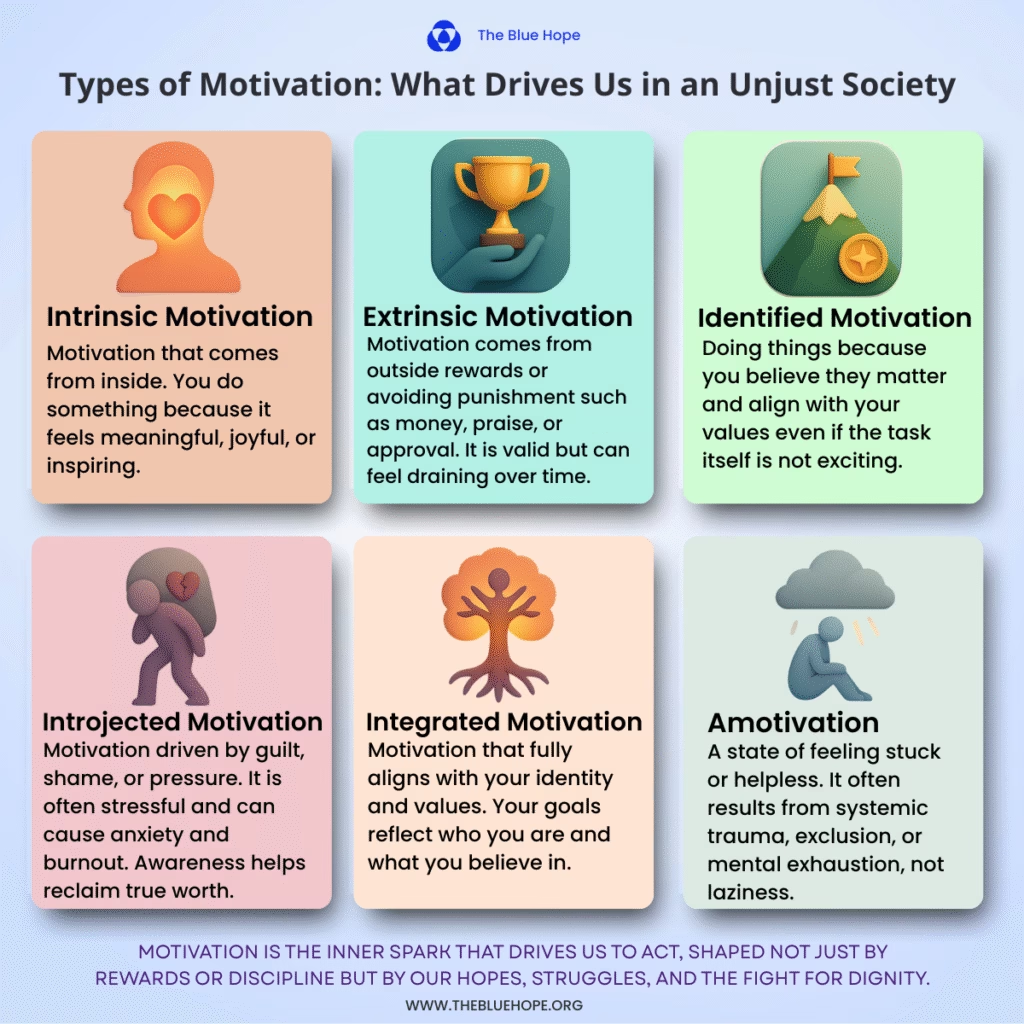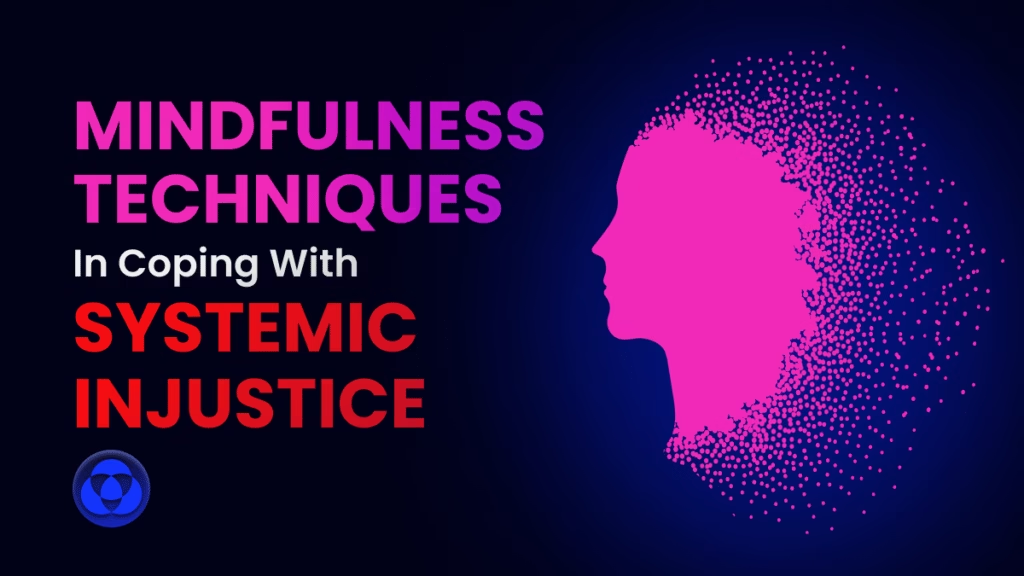For many of us from the Bahujan community, life is not always fair or easy. Sometimes we feel like no matter how hard we try, we have to struggle twice as much to get half the chances. Whether it’s school problems, money issues at home, or people treating us badly because of our caste, it’s normal to feel tired and lose motivation.
But your dreams are important. Even when things are tough, you can still find ways to stay strong and keep going. This guide will help you understand what motivation is, why we sometimes lose it, and how we can bring it back.

Understanding Motivation and the Impact of Tough Times
Motivation is not just a personal force. For many of us from historically oppressed communities, it is a lifeline. Whether you are from a Bahujan, or any marginalized background, motivation is often the quiet force that pushes us to wake up, show up, and try again. It is not just about personal goals. It is about reclaiming dignity, breaking cycles of exclusion, and proving to ourselves what this society keeps trying to deny.
But tough times make this hard. Whether it’s personal loss, exam pressure, financial instability, or caste discrimination, any of these can make it feel like our inner strength is fading. When that happens, it is not just about losing direction. It can feel like losing a piece of ourselves.
So the question is not just “Why am I not motivated?” The deeper question is, “What am I carrying that is making it hard to move forward?”
Understanding What Drains Motivation in Our Lives
Stress is not just individual. It is systemic.
If you are the first in your family to attend college, speak English, or earn a salary, your stress is not just about deadlines. You are carrying the weight of generations. You are entering rooms where you were never expected to be, and often not welcomed when you arrive. That pressure creates mental and emotional fatigue. It drains focus and confidence.
Think of a young Bahujan student in a competitive university. The syllabus is the same for everyone, but the starting line was not. That student is not just racing against a clock. They are running against structural inequality. This kind of stress does not just delay progress. It steals energy and motivation.

Uncertainty feels heavier when you were never given guarantees.
For some, uncertainty is just part of life. For others, it is all they have ever known. When a dominant-caste student feels unsure about job prospects, they usually still have networks, money, and a safety net to fall back on. But when a Bahujan student feels uncertain, the fear is deeper. Will I get the job? Will I be treated fairly? Will I be allowed to stay if I succeed?
This kind of chronic uncertainty makes it hard to plan or take action. When the system has failed your people before, it is easy to question whether your hard work will ever lead to something better.
Emotional fatigue is real. And many of us are already running on empty.
We are not just tired. We are tired of proving we are human, tired of holding back pain, and tired of acting okay in spaces that devalue us. Whether it is dealing with casteism, family trauma, or economic hardship, this emotional fatigue builds up.
When a person is grieving, anxious, or constantly facing rejection, motivation becomes a luxury. You are not lazy. You are carrying too much. And you need care, not criticism.

Fear of failure is shaped by our history.
When someone from a privileged background fails, it is seen as a personal learning experience. When someone from a Bahujan background fails, it is too often used to reinforce stereotypes. That is why many of us are scared to try again after falling once.
Imagine an entrepreneur who came from poverty and caste oppression. If their business fails, the fear is not just about money. It is about shame, about confirming what society already believes about people like them. That fear can freeze progress. It can silence dreams.
What Science Tells Us About Motivation and Mental Health
Motivation is not just about mindset. It is also about biology. Our brain releases a chemical called dopamine when we feel rewarded, excited, or hopeful. This is what keeps us moving forward. But when life is filled with stress and struggle, dopamine levels can drop. And when that happens, even things we used to enjoy may stop feeling meaningful.
A research paper by Nusslock and Miller explains how long-term stress reduces the brain’s ability to respond to rewards. This affects both our emotions and our motivation. If you are from a community where injustice is constant, this kind of stress may already be affecting your body and brain. It is not a weakness. It is a reaction to surviving in a system that was never meant to support you.
Types of Motivation: Understanding What Drives Us in an Unjust Society
Motivation is not just about hard work or discipline. For Bahujans and other marginalized communities in India, motivation is shaped by history, social exclusion, and unequal opportunities. Understanding why we do what we do helps us rebuild our inner strength and navigate the system with clarity and purpose.
Here are different types of motivation, explained with real-life relevance to caste, education, and self-worth:
1. Intrinsic Motivation: Doing it because it feels right
This kind of motivation comes from within. You do something because it brings you joy, satisfaction, or a sense of meaning.
- Example: A Dalit student reading about Ambedkar not just to pass an exam, but because learning about his legacy feels inspiring and healing.
- Intrinsic motivation grows when we feel free, respected, and connected to what we are doing.
2. Extrinsic Motivation: Doing it for reward or to avoid punishment
This comes from outside. You are motivated by a result like money, praise, a grade, or avoiding failure or criticism.
- Example: Studying hard to get a job that will help lift your family out of poverty, or to prove wrong those who question your abilities because of caste bias.
- It is a valid form of motivation, especially when survival or respect is on the line. But over time, it can feel exhausting if it’s the only reason.
3. Identified Motivation: Doing it because you believe it matters
This is when you may not enjoy the task itself, but you clearly see its value and meaning for your life and future.
- Example: Preparing for a competitive exam, not because the subject excites you, but because you want to be financially stable and support your community.
- This kind of motivation is stronger than just reward-based motivation, because it connects with your values.
4. Introjected Motivation: Doing it out of guilt or pressure
This type of motivation feels internal, but it is often shaped by shame, guilt, or the need to prove yourself to others.
- Example: A Bahujan student pushing themselves too hard because they are afraid of being seen as “less deserving” due to reservation.
- This can lead to stress, anxiety, and burnout. It helps to notice when this happens and remind yourself of your true worth.
5. Integrated Motivation – Doing it because it aligns with your identity
Here, your goal becomes part of who you are. You act because the goal reflects your beliefs and sense of purpose.
- Example: Choosing to become a teacher because you want to uplift children from your community and create a learning space where no one is discriminated against.
- This is one of the most powerful and long-lasting forms of motivation, especially when your identity and values are rooted in justice and change.
6. Amotivation: Feeling stuck, helpless, or directionless
Amotivation is the absence of motivation. You may feel like your actions will not make a difference, or that you do not have the ability to succeed.
- Example: A student giving up on studies because they have faced repeated rejection or humiliation based on caste.
- This is not laziness. It is often the result of trauma, exclusion, or mental exhaustion. Community care, representation, and healing spaces are essential for recovery.

Strategies to Stay Motivated During Difficult Times
Motivation is not always about thinking positive. For many Bahujans, difficult times are part of everyday life. These struggles are not just personal challenges but are shaped by caste discrimination, poverty, social isolation, and systemic injustice. Still, there are small and powerful ways to hold on to motivation, even when everything feels heavy.
Here are some grounded and meaningful strategies that can help you stay motivated when you feel like giving up:
1. Reconnect with Your Reason
Think about why you started your journey. Was it to support your family, to break cycles of exclusion, or to create a better future for your people?
- Example: A student preparing for UPSC may feel tired. But when they remember that their success will inspire others in their village, that reason becomes a source of strength.
2. Break the Goal into Small, Clear Steps
Big goals often feel overwhelming. Try to divide them into small tasks that are easier to manage.
- Example: Instead of saying “I have to crack NEET,” focus on “I will study two biology chapters this week.”
- Progress becomes easier when you focus on today’s step rather than the entire staircase.
3. Stay Close to Supportive People
Motivation grows stronger in safe and understanding environments. Find people who remind you of your worth and potential.
- These can be friends, mentors, classmates, family members, or even online communities that speak to your lived experience.
- If support is not easily available, follow voices that uplift and empower you.
4. Allow Yourself to Rest Without Guilt
Rest is not a weakness. For those who are constantly struggling against a biased system, rest becomes a way to protect mental and emotional health.
- Sleep well, take short breaks, go outside, or simply breathe deeply for a few moments.
- These small acts help rebuild focus and strength.
5. Build a Simple Daily Routine
A basic structure helps you stay focused even when life feels uncertain.
- Create a routine that includes small goals for study, rest, and self-care.
- It does not need to be perfect. Even a few regular habits can bring back a sense of control and progress.
6. Distance Yourself from Negative and Harmful Voices
Many Bahujans are surrounded by voices that constantly question their intelligence or worth.
- Try to reduce your exposure to those voices, whether in your home, school, workplace, or social media.
- Protect your mind and your energy by focusing on people and content that uplift you.
7. Celebrate Your Progress, No Matter How Small
Every small step forward is a big achievement, especially when you are working against many odds.
- Write down your wins or talk about them with someone who understands your journey.
- Example: Attending class even when you felt mentally drained is a reason to feel proud.
8. Look Up to Role Models Who Share Your History
Learn from the stories of people like Dr. B. R. Ambedkar, Savitribai Phule, Fatima Sheikh, or Kanshi Ram.
- These leaders faced rejection and discrimination, but they still rose and created space for millions.
- Their stories show that transformation is not only possible but necessary.
9. Accept That Low Days Are Normal
There will be days when motivation is missing. That does not mean you are weak or failing.
- On such days, give yourself space to feel, rest, and recover.
- You can always begin again when you are ready. Survival itself is strength.
10. Use Affirmations That Speak to Your Truth
Affirmations are short, positive sentences you repeat to yourself. They work better when they connect with your identity and experience.
- Examples:
- “I am enough, even when the world tells me otherwise.”
- “I carry the strength of my ancestors.”
- “My struggle is valid, and so is my dream.”
Saying these regularly can help rebuild your inner voice.

Addressing Common Concerns
1. I keep trying, but it feels like I am not moving forward. Am I doing something wrong?
You are not doing anything wrong. If you come from a Bahujan background, you are likely facing more barriers than others. These can include caste bias, lack of resources, emotional burden, and more. These are not personal failures. They are outcomes of a deeply unfair system. Your effort still matters, even if results are slow. You are running a harder race, and your progress deserves more credit, not less.
2. What if I have completely lost motivation? How do I start again?
Losing motivation does not mean you are weak. It means you are tired. That exhaustion often comes from stress, pain, and lack of support. Begin with rest. Then choose one small task and complete just that. Motivation returns slowly when you treat yourself with patience and care, not pressure.
3. How can I stay motivated when people around me constantly judge or discourage me because of my caste?
Being judged for something you did not choose is unfair and painful. When possible, reduce your contact with those voices. Seek people, books, or spaces that see your worth and understand your struggle. Remember, leaders like Dr. Ambedkar and Savitribai Phule were also rejected by society but still moved forward. You are part of their legacy.
4. I feel guilty for resting. Shouldn’t I always be working hard to prove myself?
Rest is not laziness. It is care. Many Bahujans feel pressure to overwork because they are constantly judged, but pushing yourself to the point of burnout is not proof of strength. Rest helps you continue the journey. You are allowed to pause and protect your energy.
5. What if I don’t have anyone who supports or believes in me?
That kind of loneliness is painful. If your close circle does not support you, look for online communities, books, or voices that understand your reality. Reading Ambedkar or finding others with similar struggles can remind you that you matter. You can also become the support you never had, and offer it to others like you.
6. Why do I feel more afraid of failure than others do?
Your fear is not just about personal loss. It comes from knowing that if you fail, people might blame your entire community or reinforce caste stereotypes. That fear is shaped by history, not by weakness. Even so, you have the right to try, fail, and rise again like anyone else. Failure is part of learning.
7. How do I know if I am motivated for the right reasons?
There is no single right reason. Survival, family, justice, or dreams are all valid motivations. What matters is that your reasons feel true to you. If your actions match your values and needs, the motivation will be more lasting. If you feel tired or lost, ask yourself whether your goals are truly yours or shaped by pressure to prove something.
8. What if I’m just not good enough to succeed?
This fear is common, especially when you’ve been told again and again that you are less than others. But success is not fixed. It grows with support, time, and belief. You are not defined by marks or results. Your story, your struggle, and your resilience are proof that you are more than enough.
9. Can motivation come from anger or pain?
Yes. Many Bahujans are driven by the pain of exclusion or the anger of injustice. These feelings are valid and powerful. Use them to create, to learn, and to grow. Let them push you toward your dreams and toward change for your people. Motivation rooted in truth and justice can be incredibly strong.
10. I feel stuck and directionless. What should I do first?
Begin by accepting how you feel, without judgment. Then take one small step. It could be writing down your thoughts, finishing a short task, or talking to someone. Feeling stuck is not a sign of failure. It simply means you need time, rest, and a gentle push forward. You are not broken—you are in the process of healing.

Conclusion
Staying motivated in tough times is never easy. And if you are Bahujan, the challenges you face are often deeper, heavier, and more complex. You are not only dealing with personal struggles but also the weight of caste injustice, fewer resources, and the pain passed down through generations. Yet despite all this, you keep trying. That effort is not small. It is powerful. It is courageous. It is resistance in motion.
Dr. B.R. Ambedkar once said, “Life should be great rather than long.” Greatness, for us, means choosing to keep going even when the world tells us to stop. Savitribai Phule told us, “Sit idle no more. Go, get education.” Every time you choose to learn, to grow, or simply to care for yourself, you are continuing the work she began.

There will be moments when motivation fades. You may feel lost or tired. That does not mean you have failed. It means you need rest, support, and time. Start again when you are ready. Begin with one small step. You do not have to move fast. You only need to move forward.
You come from people who survived the impossible. Your roots are strong, even if the world has tried to break them. Let the strength of your history guide you. Let your dreams remind you that you are building something bigger than yourself.
You belong here. Your goals matter. And your struggle is not just your own, it is part of a much larger journey toward justice and dignity for all.
And always remember this:
“We are not here to beg for scraps. We are here to claim what has always been ours: dignity, knowledge, and the right to rise.”
Keep going. You were born to rise.










